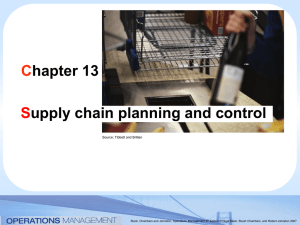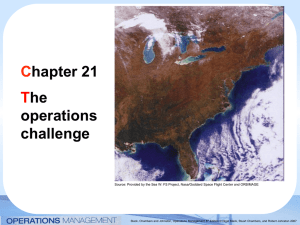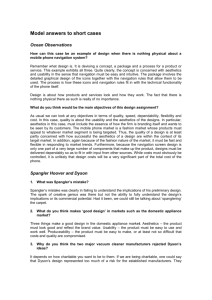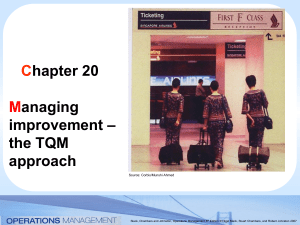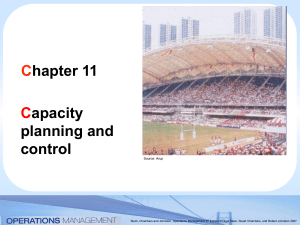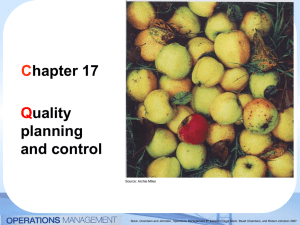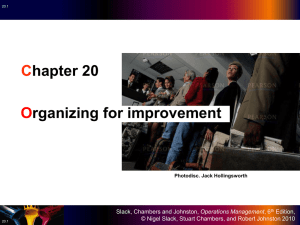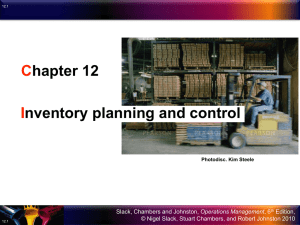PowerPoint Presentations 6
advertisement
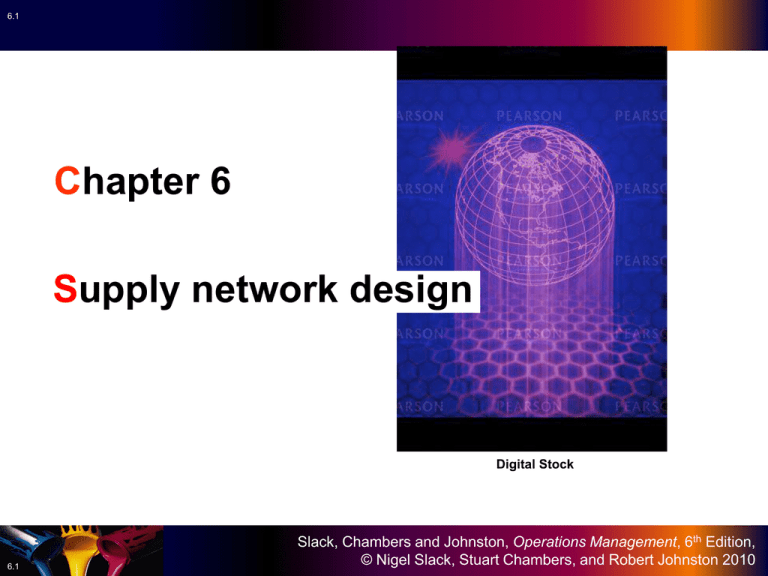
6.1 Chapter 6 Supply network design Digital Stock 6.1 Slack, Chambers and Johnston, Operations Management, 6th Edition, © Nigel Slack, Stuart Chambers, and Robert Johnston 2010 6.2 Supply network design Operations strategy Supply Network Design network design Design Layout and flow Process technology Improvement Planning and control People, jobs and organization Product/service design 6.2 Slack, Chambers and Johnston, Operations Management, 6th Edition, © Nigel Slack, Stuart Chambers, and Robert Johnston 2010 6.3 Key operations questions In Chapter 6 – Supply network design – Slack et al. identify the following key questions: • Why should an organization take a total supply network perspective? • What is involved in configuring a supply network? • Where should an operation be located? • How much capacity should an operation plan to have? 6.3 Slack, Chambers and Johnston, Operations Management, 6th Edition, © Nigel Slack, Stuart Chambers, and Robert Johnston 2010 6.4 Operations in practice Michael Dell started in 1984 by cutting out the ‘middle man’ and delivering computers direct to the customer. Using its direct selling methods, Dell went on to become the number one computer maker. Most of the reasons for Dell’s success come from the way Dell configures its supply networks. Dell’s supply network model being adapted to take account of market changes (products now available in stores). 6.4 Slack, Chambers and Johnston, Operations Management, 6th Edition, © Nigel Slack, Stuart Chambers, and Robert Johnston 2010 6.5 Operations network for a plastic homeware company Second tier suppliers Chemical company Second tier customers Wholesaler Plastic stockist Cardboard company Ink supplier First tier customers First tier suppliers Retailer Plastic homeware manufacturer Retailer Packaging supplier Direct supply Information 6.5 Slack, Chambers and Johnston, Operations Management, 6th Edition, © Nigel Slack, Stuart Chambers, and Robert Johnston 2010 6.6 Operations network for a shopping mall Second tier suppliers Recruitment agency First tier suppliers First tier customers Second tier customers Retailers Retail customers Security services Cleaning materials supplier Cleaning services Equipment supplier Maintenance services Shopping mall Direct supply Information 6.6 Slack, Chambers and Johnston, Operations Management, 6th Edition, © Nigel Slack, Stuart Chambers, and Robert Johnston 2010 6.7 Operations performance should be seen as a whole supply chain issue Benefits of looking at the whole supply chain include: It helps an understanding of competitiveness. It helps to identify the significant links in the network. It helps focus on long-term issues. 6.7 Slack, Chambers and Johnston, Operations Management, 6th Edition, © Nigel Slack, Stuart Chambers, and Robert Johnston 2010 6.8 Direction, extent and balance of vertical integration Balance — should excess capacity be used to supply other companies? Raw material suppliers Component maker Assembly operation Wholesaler Retailer Extent – Narrow process span Extent – Wide process span Direction – Upstream vertical integration 6.8 Direction – Downstream vertical integration Slack, Chambers and Johnston, Operations Management, 6th Edition, © Nigel Slack, Stuart Chambers, and Robert Johnston 2010 6.9 The decision logic of outsourcing Is activity of strategic importance Yes Does No company have No specialized knowledge Yes Is company’s operations performance superior? No Yes Is significant operations No performance improvement likely? Explore outsourcing this activity Yes Explore keeping this activity in-house 6.9 Slack, Chambers and Johnston, Operations Management, 6th Edition, © Nigel Slack, Stuart Chambers, and Robert Johnston 2010 6.10 Supply-side and demand-side factors in location decisions Demand-side factors which vary to influence customer service/revenue as location varies. Supply-side factors which vary to influence costs as location varies. For example: • labour costs • land costs • energy costs • transportation costs • community factors 6.10 The operation For example: • labour skills • suitability of site • Image • convenience for customers Slack, Chambers and Johnston, Operations Management, 6th Edition, © Nigel Slack, Stuart Chambers, and Robert Johnston 2010 6.11 The cost breakdown of shirt made in various countries and sold in France 15.55€ France 14.33€ Portugal Turkey 11.43€ Thailand 11.43€ Labour 11.13€ Morocco Transport 10.82€ Romania China 10.37€ Supplies Customs duties 9.60€ Myanmar 0 6.11 Fabric 2 4 8 6 Cost in euros 10 12 14 16 Slack, Chambers and Johnston, Operations Management, 6th Edition, © Nigel Slack, Stuart Chambers, and Robert Johnston 2010 6.12 The balance of capacity Capacity can either lead or lag demand. Inventory can be used to smooth out the peaks. Spare capacity can be used to supply other operations. The danger of this is that the original operation may receive a lower level of service. 6.12 Slack, Chambers and Johnston, Operations Management, 6th Edition, © Nigel Slack, Stuart Chambers, and Robert Johnston 2010 Unit cost curves for service centres of varying capacities Real cost per customer served 6.13 Cost curve for 5 bay service centre Cost curve for 10 bay service centre ‘Economy of scale’ curve for hotel capacity Economies of scale Cost curve for 15 bay service centre Diseconomies of scale 5 10 Average number of bays in use 6.13 15 Slack, Chambers and Johnston, Operations Management, 6th Edition, © Nigel Slack, Stuart Chambers, and Robert Johnston 2010 6.14 Capacity leading demand and capacity lagging demand Capacity leads demand Capacity lags demand Demand Time 6.14 Volume Volume Capacity Demand Capacity Time Slack, Chambers and Johnston, Operations Management, 6th Edition, © Nigel Slack, Stuart Chambers, and Robert Johnston 2010 6.15 Smoothing with inventory Smoothing with inventory Volume Capacity Demand Time 6.15 Slack, Chambers and Johnston, Operations Management, 6th Edition, © Nigel Slack, Stuart Chambers, and Robert Johnston 2010 6.16 Disney Resort Paris What were the main ‘network design’ decisions taken by Disney Resort Paris? 6.16 Slack, Chambers and Johnston, Operations Management, 6th Edition, © Nigel Slack, Stuart Chambers, and Robert Johnston 2010
